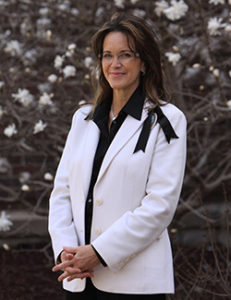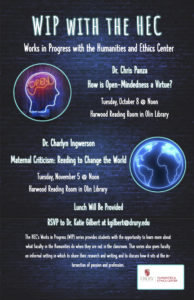Maternal Criticism: Drury’s Dr. Charlyn Ingwerson develops new literary theory
Campus News October 25, 2019, Comments Off 156Dr. Charlyn Ingwerson has been a member of Drury University’s English Department since 2008. She recently received a Ph.D. in Comparative Literature and Cultural Studies from the University of Arkansas. At Drury, Ingwerson teaches a number of writing and literature courses as well as many classes for the Middle East Studies Minor. This is where one of her greatest passions lie and, in part, the basis for her literary theory.
Ingwerson has developed a new form of literary criticism, which she calls Maternal Criticism. This title may initially be misleading because it is not about criticizing mothers or even solely about women. Rather, Maternal Criticism asks a reader to look at the text through a lens of vulnerability and how that demonstrates resistance to violence.

Dr. Charlyn Ingwerson (Photo via drury.edu)
Explaining Maternal Criticism
The crossroads of vulnerability and resistance is something that anyone who has had Ingwerson as a teacher would instantly recognize. This literary theory is the formal presentation of that. She has pulled from several renowned feminist philosophers and Middle Eastern women authors to put her theory into practice. In doing so she has found the three main points of Maternal Criticism. According to Ingwerson, it “recognizes the authority of those who mother, who resist violence, [and] who respond to the demands of vulnerability and work toward building sustainable peaceful communities.”
Ingwerson’s first point, the ‘mother’ point, may be the hardest part of Maternal Criticism she has to sell. She argues that one must see the idea of ‘mother’ not as a noun, but as a verb. Maternal Criticism sees mothering as “mother-work, de-gendered.” She then asks the critic to think of the three things mothers do: “preserve, nurture or make a space for growth and respect conscious.”
Initially, these may seem like completely disconnected subjects, but Ingwerson concludes that they all fall under the sphere of vulnerability. This leads to the second point: resisting violence. Maternal Criticism points out that vulnerability makes demands. It forces you to pay attention to it. People are horrified when innocents – the vulnerable – are hurt and taken advantage of by those in power. Violence is the opposite of mothering because it destroys, kills and ignores the humanity of the vulnerable.

WIP poster (Photo via Dr. Katie Gilbert)
Ingwerson states that this means anyone can perform the act of mothering, not just women. Since anyone can support and respect the vulnerable, anyone can mother and therefore also resist violence. She also addresses why she chose the term ‘Maternal Criticism’ for the title of her theory. Ingwerson points out that “the discomfort with the word mother might be part of the issue.”
She states, “Maybe it’s because authoritarian systems have twisted that word maternal [that has] made us uncomfortable with it.” Ingwerson points out that maybe, just maybe, it should be the other way around.
If you are interested in learning more about Maternal Criticism, Dr. Ingwerson will be formally presenting her theory as part of W.I.P with the HEC, or Works In Progress with the Humanities and Ethics Center. She will be presenting “Maternal Criticism: Reading to Change the World” on Tuesday, Nov. 5 at noon in the Harwood Reading Room in Olin Library.
Written by Afton Jagels.